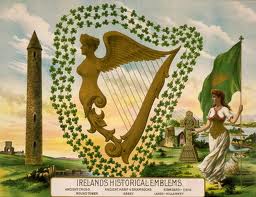“When English alternative rock singer-songwriter and lyricist Morrissey was quoted as saying, ‘Life’s full of tricky snakes and ladders,’ might he have been referring to Irish genealogy?”
~ RecordClick
Ireland is a different place now from what it was even a hundred years ago. Well, Dublin still gets a bit raucous, but it is usually in celebration with a pint of good ale. When it comes to Irish ancestor searches, however, admittedly, family history researchers today have an easier time researching genealogy in the Emerald Isle. A multitude of quaint villages still dot the countryside. Winds from the Atlantic sweep over the Cliffs of Moher. The island has been inhabited since before the time of Christ. At almost every turn there is an old castle, church or cathedral with an old cemetery. Patrick, the patron saint of Ireland, brought the Roman Catholic faith to the country in the mid- to late 400s. There should be church records and civil records, and in many cases, there are. For example, the earliest surviving text is the Book of Kells, a religious volume containing the four gospels of the New Testament that was created in about 800 A.D., about the same time as the first incursion of Vikings.
While it may be easier for genealogists today to do family history research in Ireland, especially given the Irish genealogy databases that are available online, it is still no easy task. It seems Ireland, an outpost to protect against marauding visitors arriving via the Atlantic Ocean, was a popular place. It had a good many visitors, and they didn’t always get along. About 800 A.D. the Viking set their sights on the Emerald Isle. The Normans arrived in about 1100 A.D. Around 1200, the English came calling. All of these “visitors” have influenced the history and genealogy of the country.
It would be nice if life had settled into an easy pattern, but these are the Irish after all. The people have met with all sorts of calamities and met them as only the Irish can. On one of my visits to Ireland, the guide commented that the Irish often dealt with adversaries by blowing up things, like buildings, up or burning them down. Neither is a good way to save records.
All is not lost. Searching for ancestors in Ireland takes a bit of imagination and tenacity. Let’s start with the timeline for historical background.
- Before the time of Christ – What is now Ireland was inhabited.
- Mid-400s – St. Patrick brings the Roman Catholic religion to Ireland.
- About 800– The Vikings begin attacking Ireland. Catholic monks create the Book of Kells.
- About 1000 – The Viking wars end.
- About 1100 – The Normans invade.
- About 1200 – The English arrive.
- 1297 – The system of counties is introduced in Ireland.
- 1311 – Ireland’s first university was authorized by Pope Clement V and was founded in St. Patrick’s Cathedral. It met with varying success and ended in the 1530s with the Protestant Reformation.
- 1348-1350 – The siege of Black Death, the plague, which started in Europe, spread to Ireland.
- 1530 – England’s Henry VIII broke with Rome, and England began its course on becoming Protestant.
- Mid-1500s – The Irish conduct their first rebellion against the English in Ulster (also known as Northern Ireland).
- 1592 – The University of Dublin was founded and is still in operation.
- About 1600 – The practice of Marriage Bonds began for the more elite of Irish society.
- 1700 – Irish education is not standardized. The privileged classes educate their children in private academies and with tutors. The children of the lower classes receive their education from itinerant teachers.
- 1766 – The Church of Ireland conducts a religious census. This is met with resistance from Roman Catholics.
- Early 1800s – Tithe Applotment Books are created. They record a survey to determine the amount of tithe payments to the established church – The Church of Ireland.
- 1831 – A national school system was organized.
- 1838 – Ireland was divided into districts, or Unions, in which the local rate-payers were made financially responsible for the care of the poor and starving in their area.
- 1845-52 – The Irish potato famine resulted in the death of one million citizens. Another one million emigrated from the country.
- 1847-1865 – Griffith’s Valuation was created. These were property assessments for tax purposes.
- 1921 – Northern Ireland was created by an act of the English Parliament.
- 1922 – The Public Record Office was burned during the Civil War. Records housed there included Church of Ireland parish registers, wills, and census returns. Some duplicates and copies were made before the incident.
Helpful Irish Genealogy Research Links
Ireland and Northern Ireland have a number of websites that may be of interest to genealogists. They are:
- National Archives of Ireland. Online data bases include: 1901 and 1911 censuses; tithe applotment books; lists of penal transports to Australia.
- Ask About Ireland. This is the National Irish Library website and has a number of online historical websites and data bases.
- Public Record Office of Northern Ireland (PRONI). Online resources include will calendars, Valuation Revision Books, street directories, a name search and Freeholders Records.
- Ireland GenWeb Project. Part of the WorldGenWeb Project, this website contains more localized information. Each county has a local volunteer with resources unique to that area.
In future blogs we’ll take a look at civil records, religious records, land records and court records – keeping an eye out for a leprechaun with a shamrock and good news. Of course, the expert genealogists and family history researchers at RecordClick can help out. Our genealogy research services will go a long way in helping you to find an illusive record. RecordClick’s professional genealogists can and will help you trace family history. The best part is that we are just a mouse click away.







